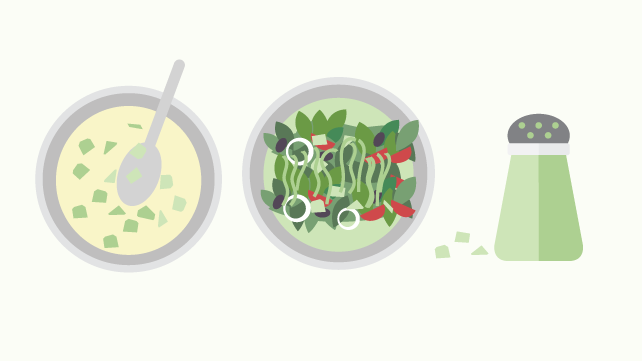
You already know to eat your daily servings of vegetables, but when is the last time you gave any thought to your sea vegetables? Kelp, a type of seaweed, is chock full of good-for-you nutrients that can benefit your health and possibly even prevent disease.
Already a staple in many Asian cuisines, this type of sea algae is a natural source of essential vitamins, minerals, and antioxidants.
What Is Kelp?
You may have seen this marine plant at the beach. Kelp is a type of large brown seaweed that grows in shallow, nutrient-rich saltwater, near coastal fronts around the world. It differs slightly in color, flavor, and nutrient profile from the type you may see in sushi rolls.
Kelp also produces a compound called sodium alginate. This is used as a thickener in many foods you may eat, including ice cream and salad dressing. But you can eat natural kelp in many different forms, including:
- raw
- cooked
- powdered
- in supplements
Nutritional Benefits
Because it absorbs the nutrients from its surrounding marine environment, kelp is rich in:
- vitamins
- minerals
- trace elements
- enzymes
According to nutritionist Vanessa Stasio Costa, M.S., R.D.N., C.D.N., kelp “is often considered a ‘superfood’ due to its significant mineral content. It’s especially concentrated in iodine, which is important for optimal thyroid function and metabolism.”
The National Institutes of Health (NIH) say that seaweed such as kelp is one of the best natural food sources of iodine, an essential component in thyroid hormone production. A deficiency in iodine leads to metabolism disruption and can also lead to an enlargement of the thyroid gland known as goiter.
But beware of too much iodine. Overconsumption can create health issues, too. The key is to get a moderate amount to raise energy levels and brain functioning. It is difficult to get too much iodine in natural kelp but this could be an issue with supplements.
Stasio Costa also notes that kelp contains notable amounts of:
- iron
- manganese
- calcium
- magnesium
- copper
- zinc
- riboflavin
- niacin
- thiamin
- vitamins A, B-12, B-6, and C
The benefits of these vitamins and nutrients are substantial. B vitamins in particular are essential for cellular metabolism and providing your body with energy. According to UCSF Medical Center, kelp has more calcium than many vegetables, including kale and collard greens. Calcium is important to maintain strong bones and optimal muscle function.
Disease-Fighting Abilities
Since inflammation and stress are considered risk factors for many chronic diseases, Stasio Costa says including kelp in one’s diet could have numerous health benefits. Kelp is naturally high in antioxidants, including carotenoids, flavonoids, and alkaloids, which help to fight against disease-causing free radicals.
Antioxidant vitamins like vitamin C, and minerals like manganese and zinc, help to combat oxidative stress and may offer benefits to cardiovascular health. There have been many claims regarding kelp’s abilities to fight chronic disease, including cancer.
Recent studies have explored the role of sea vegetables in estrogen-related and colon cancers, osteoarthritis, and other conditions. Researchers found that kelp can slow the spread of colon and breast cancers. A compound found in kelp called fucoidan may also prevent the spread of lung cancer and prostate cancer. This doesn’t mean that kelp should be used to cure any diseases or be considered a guaranteed protection against disease.
Weight Loss Claims
In recent years, researchers have looked into kelp’s potential fat blocking properties. Because kelp contains a natural fiber called alginate, studies suggest that it may halt the absorption of fat in the gut. A study published in Food Chemistry found that alginate could help block fat absorption in the intestines by 75 percent. In order to reap the benefits of alginate, the research team plans to add the thickening compound to common foods such as yogurt and bread.
Kelp may have great potential for diabetes and obesity, although research is still preliminary. A study published in the journal Diabetes, Obesity and Metabolism found that a compound in the chloroplasts of brown seaweed called fucoxanthin may promote weight loss in obese patients when combined with pomegranate oil. Studies also suggest that brown seaweed may influence glycemic control and reduce blood glucose levels, benefitting people with type 2 diabetes.
In addition to its potential to slow down fat absorption in the gut, kelp is low in fat and calories.
How to Eat Kelp
Thankfully, you don’t need to go diving in the ocean to reap the benefits. Kelp is available in a variety of forms.
Nutritionist Lisa Moskovitz, R.D., C.D.N., C.P.T., recommends that you try to eat your nutrients, versus taking them in supplement form. She suggests including kelp in a balanced diet with plenty of vegetables, from both the land and sea. Kelp can be one small part of a broader healthy diet that includes a variety of unprocessed, nutrient-dense foods.
Moskovitz says that one of the easiest ways to incorporate kelp into your diet is to add an organic, dried variety into soups. You could also use raw kelp noodles in salads and main dishes or add some dried kelp flakes as seasoning. It is usually found in Japanese or Korean restaurants or grocery stores and can be enjoyed cold with oil and sesame seeds, hot in a soup or stew, or even blended into a vegetable juice.
Too Much of the Good Stuff?
Health advisers warn that ingesting concentrated amounts of kelp can introduce excessive amounts of iodine to the body. This can overstimulate the thyroid and cause harm. There are significant health risks to consuming excessive iodine. It’s important to only eat kelp in moderation, and it should be avoided by those suffering from hyperthyroidism.
Nutritionist Stasio Costa notes that because kelp and other sea vegetables take up minerals from the waters they inhabit, they can also absorb dangerous heavy metals such as arsenic, cadmium, and lead. She recommends seeking out certified organic versions of sea vegetables and to look for packages that mention that the product has been tested for arsenic.
Always consult a health professional before beginning any supplementation regimen.
by Kristin Buettner



